
- Mar 24, 2021

Essays in 6th Grade: A Basic Format that Elevates the Standard 5-Paragraph Structure

6th grade is such a funny year. Funny haha and funny weird. Student writing levels are all over the map. You will have students coming to you writing on a very elementary level, still needing loads of help with grammar and paragraph formation. Then, you will have students ready to write critique pieces and analyses. How do you navigate this? Read to find out more!
Give Them a Format...to Start
I've learned that 6th graders still need format . They still need structure. They still need checklists. As much as I loathe limiting them in this way, I think it is very reassuring to them. That's not to say you can't tweak for the strong writers, but I do still feel they need it.
For my students in particular, I like to let them dabble in looser formats of non-fiction writing in other ways. They do book reviews , a debate , podcasting , etc. They are offered choices in reading responses to non-fiction reading and analysis, too. My classes actually write digital eBooks, too. But on the whole, they are expected to write two essays with a very similar format twice a year.
Bye-Bye 5-Paragraph Essay
Alright, so this is kind of not totally true. My students do end up writing 5 paragraphs, but that typical structure we all commonly know, I navigate away from. I think it's a fine format, but as they get into middle school they are expected to compare a LOT more and not focus on one specific topic . They are expected to follow through on a thread, a claim, a theme, an idea and how it is shown in various sources. And this is super new for them, analyzing various sources on the same concept. They really need a structure for this.
So, the typical essay, before they get to me, goes like this, and it is a good precursor:
Introduction that states your thesis and 3 major reasons to support your claim.
Conclusion that looks a whole lot like the introduction.
This format does not allow analysis of multiple sources and if you throw in other sources, it gets messy. Instead, I gear my students to focus on each source separately, then comparing them all.
The Format that Works (Research and Literary Analysis)
First of all, it's important to know what essays I actually do with my kiddos. I do a research unit. This changes almost every year, but typically they choose some kind of topic, I group them based on their topic choice. First, they do research (non-fiction skills) using a book, article, and video. They then use those sources to write an essay on a claim they make based on their topic. Later, they make eBooks in groups based on their topic.
The other essay I do is Literary Analysis . This follows a dystopian unit . They read a dystopian book in book clubs. Then, I have them choose from a short list of short stories that are dystopian. Lastly, we watch the movie The Truman Show . (This year I had them watch "The Scarecrow" on YouTube since we were hybrid due to the pandemic). They then determine a theme that is true for all three sources and write an essay based on that theme.
This essay format works for both of these essays. So here it goes!

Introductory and Conclusion Statements
In a traditional essay, students have to write a hook, their claim/thesis, and essentially ANOTHER three sentences that state what their essays will be about. In my opinion, all of this is completely unnecessary. How many times do you read introductions in books? Okay, real avid readers do, but in reality many people don't. So for these, I tell my students to get right to the point .
Here's what should be in their introductory and conclusion statements:
A statement that introduces the topic. (This is a hook of some kind. I sometimes tell them to start it with "in our world..." or "in our lives..." and something that relates to their topic. Or just starting it with their topic and explaining what it is.)
The claim/thesis.
A statement that references there are differences and similarities in the sources. (For example: "[Title of sources] support this claim in different and similar ways." That's it.)
This all ends up being 2-3 sentences.
Topic Sentences
I have my students start their essay prep with topic sentences. This helps them get a sense of where their essays will go.
The big thing to understand here is how the paragraphs are set up .
Body #1 : Focus on source #1 and how it shows claim/thesis.
Body #2 : Focus on source #2 and how it shows claim/thesis.
Body #3 : Focus on source #3 and how it shows claim/thesis.
Body #4 : Focus on how ALL SOURCES show the claim/thesis in the same way.
So they start with creating topic sentences for those paragraphs. Each topic sentence is set up like this. The last topic sentence would start with "all sources..." instead of "source title".:

Body Paragraph Format
In the picture you see below, I have specific colors for specific aspects of body paragraphs. ALL body paragraphs follow this format in that exact sequence/order. I will be completely honest, I don't give them a ton of wiggle room since this is pretty new to them. However, my stronger writers dabble in mixing evidence stems and elaboration stems around.

Their paragraph starts with the topic sentence they already prepared. From there, the next sentence begins with an evidence stem . Here are a few examples of evidence stems:
According to the text,
The author states,
In [title],
Right after the evidence stem, in the same sentence, they add their text detail to support their topic sentence. I encourage them to quote exactly from the text for most text details. They can paraphrase, too, but should really try to get exact lines.
In regards to quoting, I also mention to them not to quote plop . I made this up. I plan on making a product for this at some point. A quote plop is bad . It's when students take a line from the text and just plop it in their essay. I show them how to break up the quote from the text with their own words.
So, a first sentence may look like this: According to the text [evidence stem, highlighted green] , when Luke was hiding due to being a third child, "they took the woods away" , [text detail with context, a.k.a. not just plopping the quote in the sentence, highlighted yellow].
Directly after that sentence should be an elaboration stem with an elaboration explaining how the text detail shows their claim/thesis. Students highlight this entire sentence in blue and their claim within it dark blue. Here are some elaboration stems:
This proves [claim] because...
This shows [claim] because ...
After that they do the same process two more times; two more text details with elaborations. Lastly they do a closing sentence .

Comparison Paragraph: This is set up almost exactly the same, except the focus is on how ALL the sources show the claim in the same way. They then provide a NEW text detail from each source to prove how the claim is being shown similarly in each.

Once all their body paragraphs are written, I have them go review their introductory and conclusion statements, put everything into a final draft and leave the highlights in the essay . This helps them visualize all the components and helps me grade!
For revision, the focus is on not quote plopping, being sure their details support their thesis, changing up the wording of claims/theses, and rearranging for strong writers.
Bottom Line
While this is very limiting for some, it is super helpful for struggling writers. Having that checklist and having the highlights helps students visualize what they need to compare sources in an essay format.
I'd say it'd be great to introduce this in 6th and by 8th, they can certainly make these more interpretive, creative, and unique.
You can find a lot more detail about this in the product below . What you see here is only a taste. This contains a full sample essay, checklists, tips, and more. You can also edit it to meet your needs.

************
Want a custom bundle from me click below.

Teachers Pay Teachers Store
Recent Posts
Spring Things! Fun with Poetry and Figurative Language
Text Structure Explanatory Writing: Creating a Dodecahedron
Why I Don't Do a Daily Reading Log: What I Do Instead
Really interesting - thank you!!
This exactly the kind of thing I've been looking for, and even better! I love your approach and it's so well explained. I couldn't disagree more with any of the negative feedback to this article. I think it's perfect for my style of teaching and my standard of writing. Most of all, the way you explained this and broke it down into small steps will make it so achievable for even lagging students to develop great writing skills and feel confident in the process! You nailed it. Thank you so much!
I read all the essay writing format instructions. All the points are useful for any kind of essay writing. But at the age of high-level essay writing learners need to be essay writer experts like the 6 Dollars Essay Website , ready to do professional essay writing for any essay grade.
This is beyond me and I teach HS English. Where does this lady teach, at Princeton? I do not know any 6th grader that does this or would understand this. I see why so many of our young people have become disinterested in the learning process. I also see why so many teachers quit. The profession is stale, boring, and antiquated. This article was not fun to read and I'm thinking this new 5 paragraph writing style would be a drag for the average ela teacher to teach.
. In the blog post, I mention the various types of writing I do with students. I also have other blog posts that discuss these other formats. This is not the end all be all. In my over a decade experience with teaching writing, having a structure helps struggling writers. This is not a writing style. This a format for one type of writing. As teachers, we should be offering all types of formats, especially with younger writers who are still learning how to write.
6th grade writing
by: Hank Pellissier | Updated: August 4, 2022
Print article

This year, your sixth grader should learn to use precise language, the right pronouns, and high-quality sources for research. Public presentations are also a nerve-wracking but important skill highlighted this year. Read on to learn the key sixth grade writing skills your child should learn this year.
Introducing argument writing
Developmentally, sixth graders are entering a rebellious phase. Luckily, all this attitude has an academic outlet: argument writing . Your tween will write persuasive essays that promote their bold opinions with organized logic, backed by evidence from carefully researched, respectable sources. ( Wikipedia , The Onion , and National Enquirer won’t qualify, but Wikipedia does often link to sources at the bottom of their entries that may be acceptable.)
Your 11- or 12-year-old will also write formal essays that explain complicated topics with precise information. They’ll start with intriguing introductions, and then present their research in a clear, organized way. They will use quotes, facts, definitions, compare-and-contrast statements, cause-and-effect statements, graphics (e.g., charts, graphs), subject-specific vocabulary, and multimedia. It will all be formatted (e.g., using headings, subheadings, and bullet points), to make their points clear. They’ll end with concluding paragraphs that recap their main points.
“ To put it another way, Mommy, there is compelling evidence that I need another scoop of ice cream. ” This grown-up language sounds amusingly hoity-toity in squeaky voices, but don’t laugh when your child attempts it in daily conversation. Indeed, it is good practice for their writing.
Incredibly, what happened next was..
Storytelling is a fun part of sixth grade writing. This year, kids practice narrative writing in fiction and nonfiction papers. They learn effective ways to select their narrator, characters, setting, dialogue, descriptions, and conclusion. They work to make plot sequences seem natural. To really make their stories sing, kids should use specific details, precise language, and transition vocabulary (think: After nightfall or When she awoke ) that guides readers from one setting or plot point to another. Don’t be surprised if your shy bookworm starts writing a trilogy.
If at first you don’t succeed
Grit. Determination. Perseverance. Ernest Hemingway rewrote the last page of one of his novels 39 times. Rewriting and editing both teach kids discipline and determination. They are required to plan before they write, and then plan some more as their draft develops. They’re encouraged to outline before they start writing. They draft and redraft. They will revise certain parts and maybe restructure their entire paper. Then they will edit, possibly rewrite, and re-edit. At every turn, they’re encouraged to try new approaches. This isn’t obsessive redundancy; it helps students practice thinking about what they’re really, truly trying to say and then use their writing skills to convey their thoughts clearly and exactly.
Command of the keyboard
Writing nowadays often means typing . Sixth graders accelerate their hand-eye coordination as they evolve from hunt-and-peck slowness to rat-tat-tat-tat-tatting at a furious pace. The goal is for sixth graders to be able to sit and type three pages in a single sitting. Additionally, kids are taught online interaction and collaboration (e.g., emailing their work to each other, sharing Google docs, and adding suggestions and comments to each other’s work).
My research reveals…
Sixth graders get writing assignments that require research. To answer questions like What famous historical character do you admire? What’s your favorite invention? What endangered species do you worry about the most? , your young detective will read thick reference books and print periodicals at the library and digital data online (yes, often via Google). Students learn to evaluate the credibility of sources . Is National Lampoon as legitimate as Encyclopedia Britannica ? No. Using evidence, they compile information to write reports. They’ll learn to paraphrase what they’ve read, synthesize new thoughts, and use quotations to share information without plagiarizing.
Novel approach
Is Harry Potter more emotionally conflicted than Katniss Everdeen? Sixth graders sharpen their critical thinking skills by doing literary analysis. They’ll analyze poems, stories, historical novels, and nonfiction books. Kids learn to compare and contrast topics and themes. They’ll do this, for example, by discussing the consequences of prejudice in Roll of Thunder, Hear My Cry and in Harriet Tubman: Conductor on the Underground Railroad or by explaining how nature directs the plots of The Secret Garden and The Island of the Blue Dolphin . In nonfiction, sixth graders learn to divide an author’s statements into facts supported by evidence versus opinions. For example, was the Great Houdini truly “the world’s greatest magician” or is this an opinion? After all, David Copperfield walked through the Great Wall of China.
Pronouns: not just me-me-me all the time
Grammar isn’t easy, especially for 11- and 12-year-olds. Pronoun usage can be particularly tough. Kids learn about proper pronoun case . What’s that? Subjective case refers to pronouns used as subjects (I, you, he, she, it, we, they). Objective case indicates pronouns used as objects (me, you, him, her, it, us, they). Possessive case conveys ownership (my, mine, your, yours, his, her, hers, its, our, ours, their, theirs). Using pronouns incorrectly can leave the writer (or speaker) looking unintelligent. For example, Us and her carried apples over to yous big barn is neither proper nor pretty.
Mistakes in pronoun person are common among this age group. To correct this, your child needs to loyally stick with the “person” they started with. No switching from first person (I or me) to second person (you), or vice-versa: When I go to school, you should have your homework done, or When you go to school, a person should have his homework done . (Hint, that second example goes from second person to third person.) Both switches are incorrect and can create confusion.
Pronoun number is also crucial. If the subject indicates a plural quantity, the related possessive pronoun needs the identical number. Here’s an example of this common error: All of the school girls took her umbrella. (It should be their umbrellas) . Vague pronouns are also a no-no. Take the sentence: Alice put a vase with a red rose on the desk, and sold it. What was sold: the vase, the rose, or the desk? We don’t know because it, used here, is too vague.
Sentences, spelling, punctuation
Sixth grade writing raises the bar when it comes to sentence structure. Kids are expected to vary their sentences by alternating the length and structure to keep their writing interesting.
When it comes to spelling, many sixth graders know that spelling rules in English are finicky and have many exceptions. Kids learn to spell odd English words correctly, with silent letters ( island, crumb ) and bizarre combo consonants ( cough, pheasant ). As such, spelling is best learned through practice and, eventually, by memorizing. If your child gets frustrated spelling words like climb or plumbing , let them know that Theodore Roosevelt, Andrew Carnegie, and a committee of concerned citizens tried to simplify English spelling more than a century ago — sadly, to no avail.
Finally, as their writing becomes more advanced, sixth graders tend to use commas, parentheses, and dashes to set apart phrases and clauses. You can help by reviewing these sentences and making sure the punctuation is placed correctly.
It’s all about presentations
In sixth grade, kids will read their writing aloud to classmates. As they read, they’ll be expected to make eye contact, pronounce their words clearly, and speak loudly enough to be heard by the entire class. They’ll share their arguments, research papers, projects, and literary efforts, which will often be accompanied by visual displays, music, audio, charts, and slides. Your child may be nervous before these presentations, but hopefully your child will be empowered by the experience.
Homes Nearby
Homes for rent and sale near schools

6 ways to improve a college essay

Quick writing tips for every age

Writing on the wall
Why parents must teach writing
Yes! Sign me up for updates relevant to my child's grade.
Please enter a valid email address
Thank you for signing up!
Server Issue: Please try again later. Sorry for the inconvenience

35 Thought-Provoking Persuasive Writing Prompts For 6th Graders

Looking for a solid persuasive essay topic for your 6th grader?
The below post contains tons of great ideas that will get your 6th-grade students thinking, researching, debating, and writing!
I’m not talking about simple opinion writing topics – like their favorite food, favorite book, or how much money they should get for an allowance.
That is the the thing that my 3rd grade student would delight in arguing.
No, sixth graders are ready for more meaty topics that require a bit of research and thought. The more they dig into the topic and refine their point of view, the more they will sharpen their critical thinking and writing skills!
Don’t miss the free pdf printable at the bottom of this page with all of the ideas in one place!
Persuasive Writing Prompts For The 6th Grade Student

1. Is a dress code ever necessary?
In this prompt, students will be asked to take a stance on whether or not they think there is ever a time to enforce a dress code. Are there times when someone should be told how to dress? Such as a school dress code or wedding? Or should people be allowed to dress in any way that expresses themselves or their personality?
2. Should recycling be mandatory instead of suggested?
Students will be asked to consider whether the government should be more aggressive about recycling. They will be working with the concepts of the benefits of recycling vs. the freedoms of people.
3. Should vending machines ban junk food?
6th grade students will be asked to argue for or against the ban of junk food in vending machines. Vending machines are often used by people who are hungry and in a hurry. The vending options are usually less than healthy. Should vending machine owners be required to provide better choices? Or should they be allowed to stock their machines as they see fit?
4. Is it okay to keep exotic animals as pets?
This persuasive topic will have students take a stance on whether or not it is a good idea to keep exotic animals as pets. They will need to consider the benefits and drawbacks of keeping exotic pets and present a strong argument for their position. Make sure the student has a good understanding of the topic and the different types and sizes of animals that some people keep as pets.
5. Should the federal government impose a tax on sugary drinks?
In this prompt, students will be asked to argue for or against a government tax on sugary drinks – similar to the tax on cigarettes. They will need to consider the potential benefits of such a tax. What would the tax money be spent on? Or should people be free to drink any kind of beverage they wish, no matter how healthy or unhealthy?
6. Should life skills be a greater focus for education?
In this prompt, students will be asked to take a stance on what should be taught in school. Should the schools be doubling down on the basics of reading, writing, and math since test scores have dipped? Or should schools start allotting more time for important life skills, like time management, personal finance, and cooking, which are things many young adults struggle with.
7. Should there be age limits to use social media?
Students will list specific reasons why there should or should not be age restrictions for facebook pages and other forms of social media.
8. Is it important to save endangered species?
Students will be asked argue why enndangered animals should or should not be protected. They may be quick to make up their mind, but make sure they do research and find factual reasons that support their opinions.
9. Should video games be considered a sport?
Even though video games do not require the physical activity of traditional sports, does it still require focus, skill, and grit that would make it a modern sport? Or should that title only be awarded to an activity that requires you to sweat?
10. Should there be a ban on plastic bags?
Everyone knows plastic bags are bad for the environment, but should they be banned? What would the alternative be?
11. Is it necessary to have physical books anymore?
In the age of digital everything, are paper books still necessary? College students are already buying digital books instead of expensive physical ones. What benefits would come from doing away with paper books? What drawbacks would there be for those without a computer or solid internet?
12. Is it important to teach physical education in schools?
What is the goal of physical education? Does it have a place in the academic environment of education? Should those things be taught at home or on a sports team instead of during school hours? Shouldn’t physical activity be optional? Or is PE a vital piece of knowledge for a well-rounded education?
13. Should zoos be banned?
Do zoos raise money and awareness for animal conservation…or do they imprison animals for a lifetime that should be free and in the wild?
14. Should recess be scheduled for all kids in school? Even high school students?
What are the benefits of taking an outside break with fresh air for students? Are other subjects too important to sacrifice the time? Could older students be more productive with some sunshine and fresh air during the day?
15. If a student has good grades all school year, should they still have to take standardized tests?
If a student has shown that they are learning and progressing academically, should they have to take a long standardized test? Are there other reasons to take these tests?
16. Is hunting cruel to animals?
Most people buy their meat at grocery stores these days, so is there really any reason to still hunt animals? Does harvesting animals keep humans safe? Or does it make sport of animal lives?
17. Should gas powered cars be outlawed?
Fossil fuels are wreaking havoc on the planet, so should gasoline powered vehicles become illegal? Are electric cars a better option? Do electric cars have any drawbacks?
18. Is a rewards program or discipline more effective to motivate students?
What incentivizes kids to dive into their work, when maybe they don’t want to? Is it a really strong rewards program that will motivate them to finish a difficult task? Or fear of a consequence if they don’t complete their work?
19. Should the United States require military service for men and women, like other countries do?
Many countries require their population to do some form of federal service. America has a draft registration for men, but not for women. Should both genders be required to serve our country? Would it strengthen our nation and our people to have a common experience with service? Or is it unfair to require people to pause their lives for 2 years during the prime of their youth?
20. Should healthcare be free for everybody?
Is it a human right to get healthcare for free? If the patient doesn’t pay, then who should pay for the treatment? What benefits and/or consequences could come from reshaping our healthcare system?
21. Should candy purchases be limited based on how many cavities you have?
Dental health is very serious. Should a kid’s candy be rationed based on their dental records? The more cavities, the less candy you can have – and vice versa?
22. Is it appropriate to let kids work at younger ages, like 10 or 12, if they can do the job?
Many kids today have a strong desire to work, make money, and be successful. We have child labor laws in place to protect kids, but could that be holding them back? If they can do a job, should they be allowed to be hired? Or would that be robbing a kid of their right to a carefree childhood?
23. Should foreign language be required in school or should it be one of the elective courses?
English is spoken nearly worldwide, as it is taught in many countries around the world. What benefits come from learning another language? Should students be able to choose another elective if they don’t want to learn a new language? Or should American children try harder to be multilingual?
24. Should students be allowed to use their cell phones during tests?
You cannot get away from cell phones these days. Even small children have them! They will be a readily available resource in most work places, so shouldn’t they be allowed during tests? Or are memorization and internalization of information important skills for students to learn?
25. Should plastic water bottles be banned?
Plastic water bottles are a huge problem in our environment. Should we outlaw them to help the Earth? What kind of things are one-use water bottles used for that might be important?
26. Is it more important to continue exploration of space or the ocean?
Many wonderful advancements and knowledge have come from space exploration, but we know precious little about our ocean which covers 2/3 of the planet. Should governments be investing money into finding what lies beneath the surface instead of what’s above our heads?
27. Should reading an analog clock still be taught in school?
Digital clocks are everywhere – on your phone, stove, microwave, computer, cable box. Do you really need to learn how an analog clock works anymore? Are there times that digital clocks may not be available? Or are they becoming as archaic as a sundial?
28. Is learning proper handwriting or fast typing more important in today’s world?
Many have stopped learning cursive handwriting, so should schools also stop focusing so much on print handwriting? Should kids be spending that time learning how to type on a keyboard instead?
29. Should the voting age be lowered so elementary school students can vote?
Kids today are developing opinions and beliefs at younger ages and want to be heard. Should we lower the voting age so that children can make more of a difference? Or are most children not quite ready to handle the responsibility of voting?
30. Should AI be allowed in writing school papers if calculators are allowed in math?
Many teachers are concerned about how to tell the difference between an AI-written essay and one written by a student. Should that be a concern? If math allows calculators, can’t English classes allow help from another form of artificial intelligence? What drawback could come from not expecting kids to write their own essays?
31. Are cell phones good or bad for your health?
Cell phones are common around the world now, but are they good for us? How do they benefit our health? How might they hurt our overall health?
32. Should bees become a protected species?
Many scientists have expressed concern about the dwindling number of bees. Should these important pollinators become a protected species like the bald eagle? Or is it unreasonable to expect a person not to kill a bee that is buzzing around them?
33. Is it ever appropriate to ban a book?
Many heated discussions have come up recently about banning books. Is there ever a time that certain books should be kept from kids – like an R rating on a movie? Or should kids be allowed to read whatever they are interested in? Should offensive content be censored or should it be learned from?
34. Should community service be required for kids, middle schoolers and up?
What good could come of requiring community service from children? Or should people only serve because they genuinely want to help their community?
35. Is reading or math more important in today’s world?
Which is a more crucial skill to master? Should kids be focused on reading at the highest levels? Or should they be focused on learning the language of math at the highest levels?
Click Here To Download A One Page PDF Printable Of All The Argumentative Essay Topics

The above text link will take you to a new window where you can download and print the topics today. No email required! Terms of Use : Homeschool, classroom, co-op, and personal use only.
These essay topics will go along with any persuasive writing unit in your writing curriculum ! Let your student go through the list and find the one that really gets them excited.
If you’re looking for more fun writing prompts, be sure to check out the picture writing prompts below. There are 40 images with corresponding text that will get your kid excited to write!

Leave a Reply Cancel reply
Your email address will not be published. Required fields are marked *

Narrative Writing | Student Writing Samples
Narrative Writing Sample- Grade 6
Read Time 3 mins | Dec 8, 2021 4:23:31 PM | Written by: Toolbox
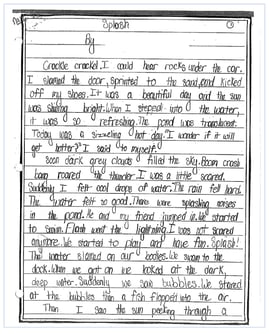
Narrative Writing Grade 6 Sample Splash!
Feedback for Improvement
What worked:
- There is a sense of story with a beginning, middle and end.
- The word choice is often high level - slammed, sprinted, flopped, tranquil, glistened
- Entertaining Beginning: There was a mix of sound, action and thought - the author established the setting - the pond on a hot day
- Elaborative Detail: There was plenty of elaborative detail - in the second paragraph, the author describes the setting - “Soon grey clouds filled the sky. Boom crash bang roared the thunder. I felt cool drops of water. We stared at the bubbles then a fish flopped into the air.”
- Extended Ending : The author used a mix of memory, hope and thought.
Can you summarize this story?
This is a story about ______________.
The problem/adventure was _____________.
The problem was solved/adventure concluded when ___________.
Feedback with Prescriptive Lesson: CHOOSE a Focus Skill:
- Section 1 Lesson 1: Introducing Graphic Organizers with Summarizing Framework
- Section 1 Lesson 9: Annotating Narrative Stories - build foundation for story writing
- Section 1 Lesson 11: Analyzing Assignments for Givens and Variables - creating pre-writing plans
Suspense: There was some evidence of suspense in the word “Suddenly,” however, it would improve the writing to add a magic of three as the thunderstorm rolled in.
- Section 4 Lesson 3: Red Flag Words and Phrases
- Section 4 Lesson 4: The Magic of Three
Main Event: What appears to be the main event is mostly description with some very general action. What was the main event of the story? Once that is established then add a balanced mix of action, description, thoughts/feelings, dialogue, and sound.
- Section 5 Lesson 1: Comparing Summaries
- Section 5 Lesson 2: Main Event
This student will benefit from participating in modeled lessons to develop the middle of the story- both suspense and main event.
Recommended Resources
- Empowering Writer's Methodology
- Narrative Writing Guide for Grade 6


- East Brunswick
- Hillsborough
- South Brunswick
- South Plainfield
- (732) 659-4364
- PARENT PORTAL
How to Write A 6th Grade Level Essay
Your child has started sixth grade, which may be the start of middle school for them. This is an exciting time for a lot of reasons, but they are also learning how to write much more sophisticated and interesting essays. This is also true for the writing prompts they are seeing. The prompts can be creative, informative, expository, persuasive, or a combination of the categories they’ve seen up until now. They will have to understand what kind of essay to write based on the prompt itself and how to answer it.
Here are examples of writing prompts they may see:

- Write a short story about your favorite fictional character. This prompt can have a narrative or creative response, or both at the same time. The response should make sense for that character, for example, if they are writing about their favorite character that is a regular cat, having that cat fly to the moon wouldn’t be a good response.
- What is the strangest thing that’s ever happened to you? This would be a good prompt for a narrative essay. Your child will have to give a lot of detail relating to what they saw, felt, heard, and did in a logical order. It doesn’t have to be a chronological story; by this point, they may be able to creatively tweak the timing of things to make it more interesting. For example, they may start their story with, “Waking up that morning, I had no idea that my day would end up so strange.” They are writing from the perspective of already experiencing the events, so this is appropriate.
- Write a poem about your grandparents. This is a creative prompt that can be a lot of fun for your child. They should have been introduced to similes, metaphors, and other literary devices and they should use those when they can in their creative responses. Writing a poem gives them a chance to exercise these new skills and allows them to explore more emotions without having to worry about narrative structures.
If your child is struggling with their writing, it may be helpful to enroll them in Reading Genie. The program at Reading Genie is designed to help students not only catch up, but get ahead in their writing skills. They are given fun and engaging prompts that the teachers can help them with, and they get the practice they need.
It can also be helpful for you to do the writing prompts with your child. Even if you both don’t write anything, talking about these kinds of ideas or questions is a great way to help your child get their creative juices flowing, and they can apply those ideas to writing prompts later. It can be a lot of fun, too!
Check out the top-rated writing tutoring program in New Jersey . Held at our New Jersey tutoring centers , our middle school writing program is specifically designed to meet state standards and help prepare students for standardized testing. Learn more about our writing classes in East Brunswick , writing classes in Hillsborough , writing classes in Marlboro , writing classes in South Brunswick , writing classes in Plainsboro , and writing classes in South Plainfield .
Source: https://www.journalbuddies.com/prompts-by-grade/writing-prompts-middle-school/
Topics: Essay , Writing Skills , paragraph writing , Sixth Grade , Writing Prompt
Get A Free Assessment
Sign up or call 732-651-2700 to schedule your free class.

Latest Article
- Introducing the Genie Academy Rewards Program!
- Key Facts and Statistics About Math, Math Games, and Apps
- Best Math Tutoring Programs For Kids in New Jersey
- Studies on Poor Math skills lead to poor financial outcomes
- Return on Investment of Genie Academy

Get Free Updates
Sign up to receive our newsletter
What To Do Next…
1 Get your free 60-minute Child Assessment and learn:
- If your child is learning at the appropriate age level .
- Your child’s strengths and where they need additional help .
- If your child has an affinity for a particular subject, they may excel in .
- Our professional recommendations and learning strategy for your child.
- And much more…
2 Have more questions? Call us at 732-651-2700 to discuss your Child's specific needs.
SIGN UP FOR A FREE CLASS
Related posts.

July 28, 2022
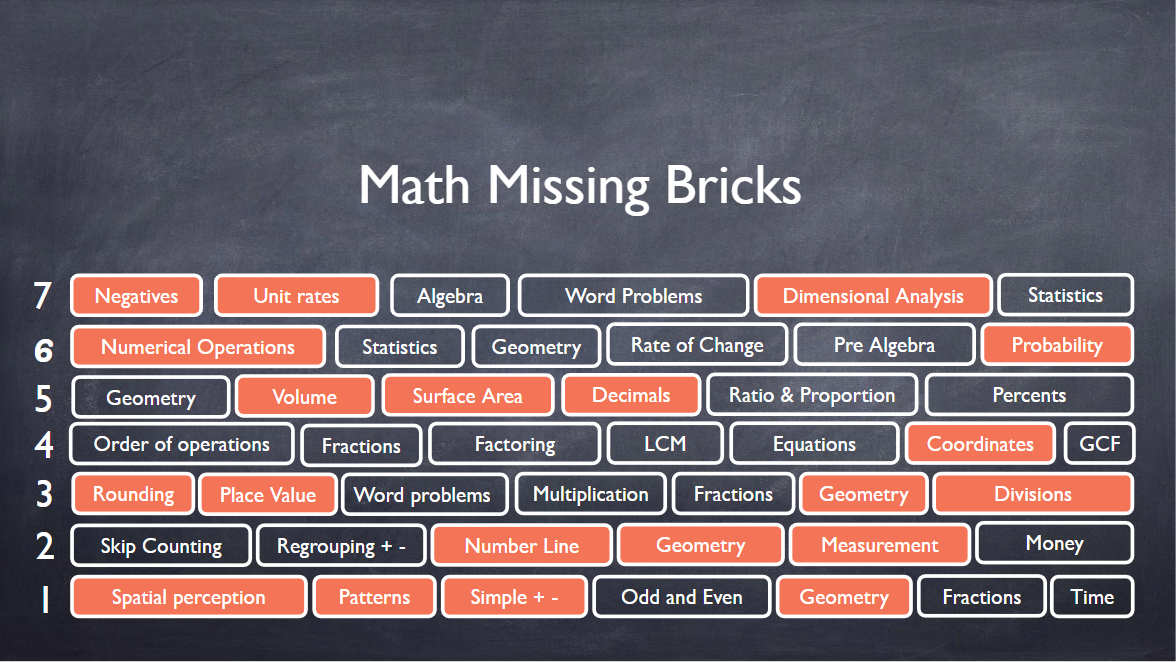
July 21, 2022

July 20, 2022

50 Engaging 6th Grade Writing Prompts for Thoughtful Essays
Sixth grade marks a big transition in students’ lives. They’re no longer little kids, but they’re not quite teens either–that’s what middle school is all about. To help your students bridge this transition with ease, it’s important to give them plenty of opportunities to practice their writing skills since they’ll be doing a lot of writing in high school and beyond.
Over and above that, writing can be the perfect way for kids to express themselves and explore the world around them. That will only happen if you give them the space to do so, though, so here are 50 engaging 6th-grade writing prompts to help your students get their creative juices flowing.
Narrative Writing Prompts
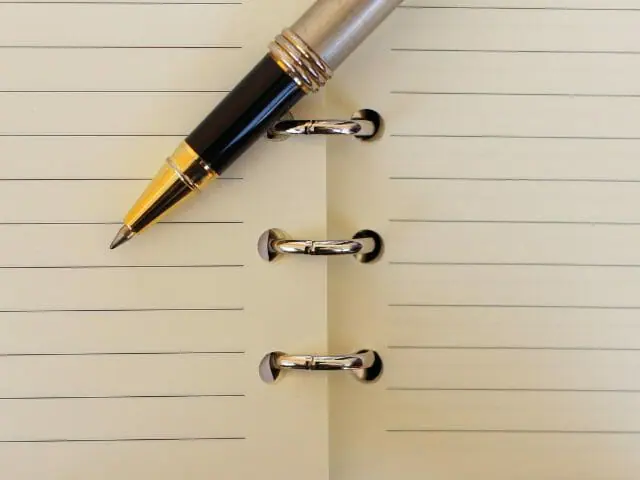
Narrative writing revolves around telling a story with a plot that has rising action, a climax, and a resolution. These narrative writing prompts will give your 6th-grade students plenty to think about–and write about.
Story Starters

Students will often struggle with where to start their stories. These story starters will help them get past that initial hurdle by giving them some ideas to get their narratives going.
1. I had the biggest fight with my best friend yesterday. It all started when…
2. My first trip to the beach wasn’t what I expected. I thought it would be…
3. I’ll never forget the time when I was lost in the city. It was…
4. I had the biggest surprise of my life when…
5. My family went on the craziest road trip last summer. We started out by…
As you guide your students through their writing journey, make sure to encourage them to be creative and have fun with it – but still have them include the essential elements of a story, like rising action, a climax, and a resolution, so that their stories are well-rounded and engaging.
Personal Narrative Prompts

Personal narratives are all about giving students the opportunity to tell their own stories in descriptive ways. Here are writing prompts to get them started.
6. What’s the best (or worst) birthday you’ve ever had? Why was it so great (or terrible)?
7. What’s the bravest thing you’ve ever done? What made you do it?
8. Think about your future self–where do you see yourself in 1 year? Write about it.
9. Think about the best day you’ve ever had. What made it so special?
10. Describe a time when the weather was really extreme. Describe it.
Reflective Writing Prompts

Reflective writing is a lot like journaling–it gives students the opportunity to process their thoughts and feelings on a given topic. These reflective writing prompts/journal prompts will encourage thoughtful reflection in your students while giving them some fun.
11. Make a list of your favorite things about yourself.
12. Take a walk in nature and describe what you see. What emotions does it evoke in you?
13. Describe your sports or extracurricular activities. What have you learned from them all?
14. Make a list of all the emotions you experience throughout the day.
15. Make a record of your daily objectives. Consider which one was the most simple to accomplish.
Journal prompts are usually effective because they make you think about a certain topic in a different, more introspective way, and so students should be encouraged to approach these writing prompts with open minds and hearts.
Informational Writing Prompts

Informational writing is an essential skill for middle-schoolers, especially as they head into high school and college, where they’ll be expected to write long-form essays rather than fiction. These informational writing prompts will give your students plenty of practice with this type of writing.

Expository Prompts
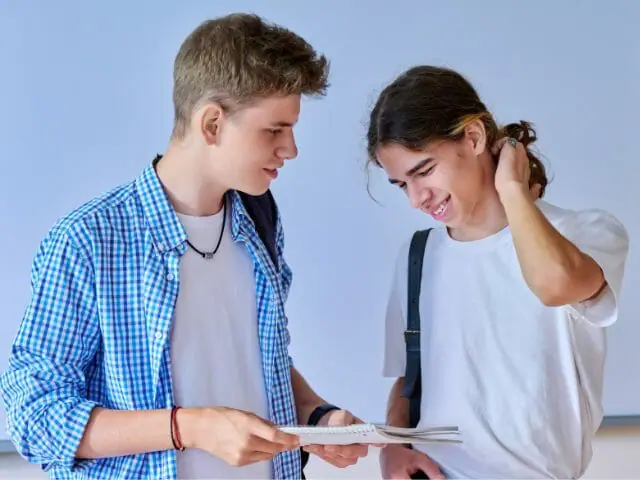
Expository writing is a type of nonfiction writing that requires students to investigate an idea, assess evidence, expand on the idea, and present an argument concerning that idea in a clear and concise manner. These prompts will help your students hone their expository writing skills.
16. Compare and contrast two of your friends.
17. Choose a challenge at your school. What’s the ideal solution for it?
18. Discuss a problem in a movie you enjoy. What was the outcome of the situation?
19. What was the cause of a recent argument you had? What was the effect?
20. Find an interesting story/narrative in your local newspaper and tell it in your own words.
Research Prompts

Next, research writing prompts will help students practice their research skills by investigating a given topic and finding credible sources to support their claims. These research writing prompts will allow your students to conduct investigative research and write about what they’ve found in detail.
21. How long can fish survive without water?
22. What animals are on the verge of extinction?
23. What’s the history of your favorite sport, and how did it develop?
24. What are people’s civil rights, and who has fought for them?
25. Explore your dream career. What skills would you need to succeed in it?
This may be a good time to introduce your students they could use to reference their information and give credit where it’s due. Inform them that not all sources are created equal, and brainstorm some tips for evaluating the credibility of a website.
Procedural Prompts

As their name suggests, procedural writing prompts provide students with the opportunity to write clear and concise instructions on a given topic. These prompts will help your sixth graders learn the essentials of procedural writing.
26. Make a user guide for anything you use frequently (e.g., your computer, smartphone, video game console).
27. Write a set of instructions for cleaning your room.
28. Teach a younger reader how to do homework without wasting time.
29. What’s the quickest way for you to go to the library if you’re in your classroom now?
30. Describe the steps involved in tying a shoe.
Argument Writing Prompts

The next type of writing prompt is argument writing. Argumentative writing is a type of nonfiction writing that requires students to investigate a topic, collect evidence, and assess their findings to defend a point of view while also considering the perspectives of others.
These argumentative writing prompts will give your young writers practice with this type of persuasive writing.
Argumentative Essay Prompts

The most common type of essay prompt on standardized tests is the argumentative essay question since it’s intellectually challenging. In these questions, students will be given a prompt and they’ll be asked to take a position on an issue or topic.
They’ll then need to provide satisfactory evidence from their research to support their position. Here are some prompts to get them started.
31. Should school uniforms be required in all schools?
32. Is it ever okay to break the law?
33. Do you think people should be required to vote? Why or why not?
34. Is Monday through Friday the best school schedule?
35. Is it important to learn science?
Persuasive Prompts

Emotional appeals can be a powerful tool in persuasive writing. In these prompts, students will need to use their powers of persuasion and other rhetorical strategies to convince their readers to see their point of view. Here are persuasive prompts to put your students’ powers of persuasion to the test.
36. Make a case for or against year-round schooling.
37. Should there be a limit on the amount of homework students can receive?
38. Persuade your parents to let you choose your own bedtime.
39. What’s the best way to deal with bullies in schools?
40. Who’s the greatest sports athlete of all time?
Poetry Prompts
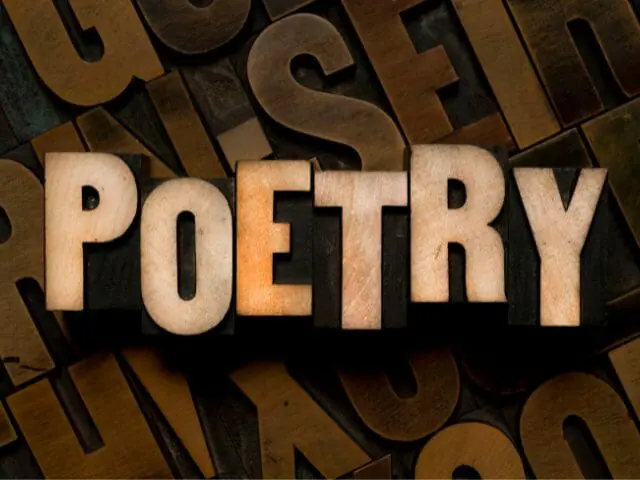
Poetry prompts are a great way to get your students to write creatively. These prompts will help your students tap into their imaginations and write poems that are both beautiful and moving. Whether in free verse or strict meter, your students will be sure to impress you with their poetic prowess.
41. Write about how you’re feeling right now in a haiku .
42. Create a poem in memory of a book, TV, or film character who has died.
43. Choose an onomatopoeia and use it five times in a poem.
44. Consider a metaphor for the current school year and create a poem about it.
45. Write a friendship poem in which every line includes a rhyme for “friend.”
Creative Writing Prompts

Last but not least, creative writing is all about using imagination to create a piece of writing that’s unlike anything else. This creative writing prompts will help your students tap into their imaginations and write some truly unique pieces revolving around self-expression.
46. If I could have any superpower, it would be…
47. Write about a day in the life of your favorite cartoon character.
48. If you could be a historical figure for a day, who would you choose to be?
49. Write a family story from the perspective of your pet.
50. Invent a new holiday and describe how it’s celebrated.
Jump In : Better prepare your 6th graders for this activity by improving their reading comprehension first! Proceed to read my list of fun comprehension exercises here — 11 Fun 6th Grade Reading Comprehension Activities (& Games) .
Dust Off Those Pencils and Get Ready to Write!
While many students lose motivation as their first middle school year goes on, these 50 6th grade writing prompts will help keep them excited about writing all year long. With tons of different genres and modes of writing to choose from, there’s something here for everyone! So get those pencils sharpened and those minds thinking—it’s time to start writing!
Last Updated on July 24, 2022 by Emily
- Pinterest 67
Emily is an active mother of two and a dedicated elementary school teacher. She believes the latest technology has made a huge impact on the quality of early learning and has worked hard to upgrade her classroom and her own children’s learning experience through technology.
Follow her on Twitter , Pinterest , and Instagram for more teaching fun!

Save my name, email, and website in this browser for the next time I comment.
404 Not found
- Assignment Writing Service
- Homework Service
- Write My Essay
- Report Service
- Personal Statement Service
- Research Paper Service
- Speech Service
- College Essay Writing Service
- Our Writers
- Testimonials
- Manage your orders
- Place your order instantly
6th Grade Essay Written at the Highest Possible Level of Middle School

3 Peculiarities of the 6th-Grade Essay
- Structure. As well as a classic essay, a 6th-grade essay has an introduction, three body paragraphs, and conclusion. The introduction of each written work should have a clear thesis statement or argument. Likewise, it must be logically complete and express a specific idea.
- Topic. Before dealing with specific issues like the global market and economics or changes in climate, middle-school students are required to know how to speak on the broad topics of any chosen school discipline. Usually, students practice English writing skills speaking about books read in summer or expressing their opinions on various issues without extra in-depth research. It is crucial for 6th-grade students to become all-around so that they could state something valuable in high-school and college research papers.
- Style. Nobody cancels the rules for writing and editing an essay at the 6th-grade of school. Conversely, they are introduced and checked all the time so that students will have fewer difficulties with academic writing later. Don’t get in a snit with your teachers as they are trying to be helpful for you in the future when you will need to write tons of assignments.
3 Ways to Write the 6th-Grade Essay

- You should consider some essay ideas you want or need to develop on your own. Hopefully, the following list of the 6th-grade essay topics will come in handy: – What Do You Want to Be When You Grow Up? How Will You Achieve It? – When Do You Feel as the Happiest Person on the Planet and Why? – What Are You Afraid of Most and Why Does It Make You Feel Such Fear? – Who Is the Best Friend for You and Why? – Who Is the Most Inspirational Person in Your Life and What Inspires You in This Person? – What Famous Person Would You Like to Meet Today and Why? – What Is the Life of Adults for You? Is It Fun or Challenging?
- You should stick to a basic essay structure while writing the 6th-grade essay. You have already known that the basic structure of any essay is as follows: an introduction, body, and conclusion. – Introduce the main idea of your essay with a bit of context (e.g., “Most people find inspiration in people around – parents, friends or reputable people from the TV screens. And I am no different. My elder brother inspires me to take up the sport.” ), which functions as a good opening sentence for your essay on the topic, “Who Inspires You?” – Support the main idea with clear reasons and relevant evidence. Going on speaking about the most inspirational people in your life, you can use some real-life examples that are sources of inspiration for you. For example, your brother/sister/dad/mom wakes up early to take some physical exercises in the morning or something of this kind that makes you get inspired. – Provide the concluding statement that follows from the content presented before. First or last, you’ll need to end your essay, at least because of a word/page count. Conclude your essay logically for the reader. Don’t mention any new fact and don’t write, “That is all” (remember that no contraction is allowed in academic writing?) Just sum up all the mentioned points of your essay briefly with a concluding sentence, “I am sure many of us can find inspiration people around. You fully realize that my brother is a direct inspiration for me. Look around to find such an inspirational person as well.”
- You should adhere to a particular style of writing and formatting. As for writing, the style depends on the purpose of writing. Whether you describe, persuade or narrate, you should use appropriate words and phrases. For example, descriptive language appeals to all our senses: taste, touch, sight, smell, and sound. In descriptive essays, modify all nouns and verbs with adjectives and adverbs accordingly. Be as specific as possible. As for the formatting style, consult your instructor which one you need to use to format a page header, margins, line spaces. All that play a great role in the readability of your text. Don’t neglect an essay format so that it will be easy for the reader to follow the content of your essay.
All 3 Details of the 6th-Grade Essay Applied in Practice
Now, it’s time to see how all 3 details mentioned above are applied in practice. Read the following essay on the topic “My School” to get the grasp of writing the 6th-grade essay as required and expected by your educators.
“I study in one of the best schools in Princeton. I enjoy my time spent in school because of my friends, teachers, and different interesting activities. Like every pupil, sometimes, I do not have time to prepare all the needed homework, but still, I try to do everything possible to make my parents proud of me. In addition, I understand that the received knowledge and practical skills will come useful for me in the future.
My school is located on the outskirts of the city, and it is possible to see a small but very beautiful park from the class windows. There are a lot of big old trees around the school. Every time when the autumn comes, the road to school is covered with bright fallen leaves. Our school is large and bright. Teachers are doing everything to make rooms nice and cozy, and we are happy to help them in this. All the students do their best to maintain the cleanliness and order in the rooms. In addition, there is a library at our school, a cozy canteen, and a beautiful auditorium. Of course, a favorite place for many students is the sports hall with different sports equipment. It has a lot of free space to play our favorite games during the physical education classes.
Also, I want to talk about our teachers. Sometimes, it seems that they are very strict with us, but in spite of this, we have great respect for them. They are fair and wise, and we can totally rely on them if we need some advice or help. Our teachers do their best in order to give us the necessary knowledge in an interesting way. When I was younger, our lessons in primary school were mostly about games and interactive activities. Now, we are engaged in more serious things like math, history, and linguistics.
I have a lot of friends at school and all of them are very positive and kind. When I had my birthday party two months ago, I asked my parents to invite my classmates. I was so happy to celebrate my eleventh birthday with my close friends. Moreover, my friends usually invite me to celebrate their birthdays with them, and I like picking special presents. My best school friend is Kate. Even if we have a row, the next day we usually make it up. This is because we are true friends and we are bound by common interests.
To sum up, at the current moment school is an important stage of my life. It is known that every great thing starts with small steps. Little sprout becomes a big tree, brook flows into the river, the words turn into sentences and big novels. Children begin to experience adult life in the school. That is why I appreciate my school, and even after many years, I will remember it with warmth and gratitude.”
Hopefully, this article is useful for you to write the 6th-grade essay – all the essay peculiarities are described and applied. Have a look at it again or consider the following list of 5 extra resources to write a good essay at the 6th grade.
5 Extra References to Write a Good 6th-Grade Essay
- Aczel, R. (1998). How to write an essay. Stuttgart: Klett.
- Harms, M. (2003). How to Write a Thesis. Physiotherapy, 89(9), 563. http://dx.doi.org/10.1016/s0031-9406(05)60184-8
- Macceca, S. (2007). Traits of good writing grade 6. S.l.: Shell Education.
- Minden, C. & Roth, K. (2013). How to write an essay. Ann Arbor, Mich.: Cherry Lake Pub.
- Scanlon, L. (2015). My school: Listening to parents, teachers, and students from a disadvantaged educational setting. Abingdon: Routledge.
- Book Review
- College Life Struggle
- Eminent Literature Personalities
- Essay Samples
- Historic Personalities
- Interesting Research Papers
- Interesting Stories
- Research Paper Examples
- Useful Tips
- Writing Tips
Our Unique Features
- 100% Moneyback Guarantee
- Plagiarism Free Guarantee
- Free revisions according to our Revision Policy
- Free title page
- Free bibliography & reference
- Free formatting (APA, MLA, Chicago, Harvard and others)
- 24/7 Customer Support
Spend Less Time on Research!
Puzzling Over Your Essay? Leave It to professionals!
Jump to navigation
- Inside Writing
- Teacher's Guides
Student Models
- Writing Topics
- Minilessons
- Shopping Cart
- Inside Grammar
- Grammar Adventures
- CCSS Correlations
- Infographics
Student Writing Models
How do I use student models in my classroom?

When you need an example written by a student, check out our vast collection of free student models. Scroll through the list, or search for a mode of writing such as “explanatory” or “persuasive.”
Jump to . . .
Explanatory writing.
- How Much I Know About Space Explanatory Paragraph
- My Favorite Pet Explanatory Paragraph
- Sweet Spring Explanatory Paragraph
Narrative Writing
- A Happy Day Narrative Paragraph
- My Trip to Mexico Narrative Paragraph
Creative Writing
- Happy Easter Story Paragraph
- Leaf Person Story
Research Writing
- Parrots Report
- If I Were President Explanatory Paragraph
- My Dad Personal Narrative
- The Horrible Day Personal Narrative
Response to Literature
- One Great Book Book Review
- A Fable Story
- Ant Poem Poem
- The Missing Coin Story
- Winter Words Poem
- Horses Report
- Ladybugs Report
- How to Make Boiled Eggs How-To
Persuasive Writing
- Plastic, Paper, or Cloth? Persuasive Paragraph
- The Funny Dance Personal Narrative
- The Sled Run Personal Narrative
- Hello, Spring! Poem
- Cheetahs Report
Business Writing
- Dear Ms. Nathan Email
- My Favorite Place to Go Description
- My Mother Personal Essay
- Rules Personal Essay
- Shadow Fort Description
- Adopting a Pet from the Pound Editorial
- Letter to the Editor Letter to the Editor
- Ann Personal Narrative
- Grandpa, Chaz, and Me Personal Narrative
- Indy’s Life Story Personal Narrative
- Jet Bikes Personal Narrative
- The Day I Took the Spotlight Personal Narrative
- A Story of Survival Book Review
- Chloe’s Day Story
- Did You Ever Look At . . . Poem
- Dreams Poem
- I Am Attean Poem
- Sloppy Joes Poem
- The Civil War Poem
- The Haunted House Story
- The Terror of Kansas Story
- When I Was Upside Down Poem
- Deer Don’t Need to Flee to Stay Trouble-Free! Report
- Height-Challenged German Shepherd Report
- Friendship Definition
- What Really Matters News Feature
- Cheating in America Problem-Solution
- Hang Up and Drive Editorial
- Musical Arts Editorial
- Summer: 15 Days or 2 1/2 Months? Editorial
- A Cowboy's Journal Fictionalized Journal Entry
- Giving Life Personal Narrative
- The Great Paw Paw Personal Narrative
- The Racist Warehouse Personal Narrative
- Limadastrin Poem
- The Best Little Girl in the World Book Review
- How the Stars Came to Be Story
- Linden’s Library Story
- My Backyard Poem
- The Call Poem
- I Am Latvia Research Report
- Mir Pushed the Frontier of Space Research Report
- The Aloha State Research Report
- The Incredible Egg Observation Report
- Unique Wolves Research Report
- Dear Dr. Larson Email
Personal Writing
- A Lesson to Learn Journal
- Caught in the Net Definition
- From Bed Bound to Breaking Boards News Feature
- If Only They Knew Comparison-Contrast
- Save the Elephants Cause-Effect
- Student Entrepreneur Reaches for Dreams of the Sky News Feature
- Internet Plagiarism Problem-Solution
- Mosquito Madness Pet Peeve
- Anticipating the Dream Personal Narrative
- Huddling Together Personal Narrative
- H’s Hickory Chips Personal Narrative
- It’s a Boy! Personal Narrative
- My Greatest Instrument Personal Narrative
- Snapshots Personal Narrative
- Take Me to Casablanca Personal Narrative
- The Boy with Chris Pine Blue Eyes Personal Narrative
- The Climb Personal Narrative
- The House on Medford Avenue Personal Narrative
- Adam’s Train of Ghosts Music Review
- Diary of Gaspard Fictionalized Journal Entry
- My Interpretation of The Joy Luck Club Literary Analysis
- Mama’s Stitches Poem
- The KHS Press Play
- Rosa Parks Research Report
- The Killer Bean Research Report
- Mid-Project Report on History Paper Email
- Vegetarian Lunch Options at Bay High Email

6th Grade Essay Topics – Best 100 Essay Ideas for Sixth Graders
6th grade essay topics don’t have to be boring and uninspiring. With the right essay topics, sixth graders can express themselves in depth and descriptively. This article aims to highlight 100 amazing essay topics for 6th graders that’ll enhance their writing skills and improve their mental performance. These essay topics all meet the Common Core Standards.
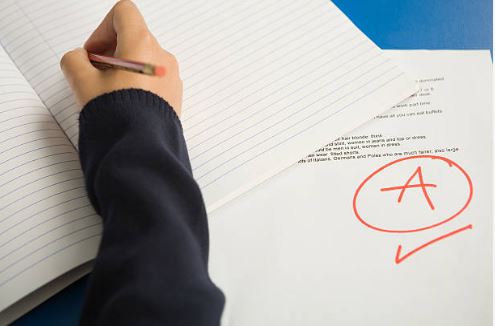
Since the 6th grade is the bridge to middle school, teachers will ensure students are prepared for middle school. The emphasis will be laid on the quality of writing and frequent writing assignments and tasks. The key to boosting the writing creativity of 6th graders is allowing them to research essay topics in advance. This will enable you to be more prepared and organised. To find the perfect 6th-grade essay topics, you have to allow your students to sift through the list of essay topics and select the one they feel interested in.
Narrative Essay Topic for 6th Grade
Whether you want your students to recount an event that happened shortly or an adventure that need them to fuel their imaginative spirit, narrative essays tell a story. The narrative essay is structured with a plot, which organizes it into beginning, middle and end.
Here are some narrative essay topic for 6th graders:
- Think about the best day of your life. What made it so great?
- Who is the oldest person you know?
- Describe a friend situation that changed over only one day.
- Write about how it feels when you’re alone.
- Describe your favourite vacation.
- Has a book, movie, or album ever changed your life?
- Think about your future self. Write about a day in your life, one year from today.
- Tell a family story from your perspective.
- Describe a memory you have of extreme weather.
- Think about a time you had to work hard to learn something.
- Your first day of school.
- Your most exciting day of school
- A field trip that your class took.
- Your favourite summer vacation.
- A trip that included something unexpected or surprising.
- A time that you experienced something spooky.
- A time that you experienced something truly frightening.
- A time that you learned something new that changed you in some way.
- The moment when you met someone who changed your life.
- The day that you got your first pet.
- A move from one place to another.
- Something funny that happened to you.
- Something funny that happened to one of your family members or friends.
- Something embarrassing that happened to you.
- Your favourite birthday party.
- A birthday that was disappointing.
- A big storm (rain, snow or even a tornado!).
- A time that the power went out.
- A summer day when the temperature got much higher than expected.
- A time when you went to an amusement park
- A time when you got lost somewhere.
- A memorable experience with a favourite family member
- A sad experience with someone about whom you care
- Your most exciting moment playing sports
- Your most exciting moment is performing in a play, singing, playing music, or dancing.
- An experience that left you feeling frustrated.
- An experience that was hard but ended up being worth it.
- A time that you experienced rejection.
- A weird encounter with a stranger
- A random act of kindness.
- A time that you took a stand for someone or for an issue that you care about.
- A moment when you thought you might get hurt but didn’t.
- Breaking a bone (or otherwise suffering an injury).
- Your first time away from home for the night (or longer).
- A time when you experienced a historic event.
- Where were you when a major event happened? (Note: You don’t need to have been at the site of the event; this prompt is about where you were when you found out about the event and how you reacted.)
- A time when you rebelled against your parents or teacher.
- A dangerous experience.
- A misunderstanding between yourself and someone else.
- A difficult decision that you had to make.
- The end of a friendship or relationship.
- The beginning of a friendship or relationship.
- A time when you judged someone first and then realized that you were wrong about the person.
- A time when someone judged you first and then realized that he or she was wrong about you.
- A moment when you felt that you were starting to grow up.
- A time when you saw one or both of your parents in a different light.
- A time when you looked up to your older sibling
- A time when your younger sibling looked up to you
- A time when you were grateful to be an only child.
- An experience that you think has only ever happened to you!
Expository essay topic for the 6th Grade
Expository essays are informative. They are fantastic tools you can use to teach your 6th graders about the method of exploring and researching. You’d want to build their writing skills. So here are some Expository essay topic for the 6th graders:
- Write an extended definition essay on one of your vocabulary words.
- Pretend a friend hasn’t seen your favorite TV show. And what is it about?
- Compare and contrast two of your friends.
- Describe your school year so far. And what have been the most important events?
- Choose a problem at your school. And what’s the best solution?
- What was the cause of a recent argument you had? And what was the effect?
- Compare and contrast two of your favorite sports or activities.
- Discuss a conflict in a movie you like. And how was it resolved?
- Write a definition essay about the concept of empathy.
- Explain how to send a friendly text message.
- Teach a reader how to play your favorite board or card game.
- Write about the steps needed to tie a shoe.
- Create a user manual for something you use a lot (e.g., hair straightener or cell phone).
- Describe how you get home after school.
- Tell a younger reader how to do homework without wasting time.
- How do you get to the library from your classroom?
- How do you choose what to watch on a streaming service?
- Explain how to pass a difficult level in a video game.
- Write about the steps you follow to listen to your favourite music.
Argumentative essay topic for the 6th Grade
Read: How to Write a Unique Scholarship Application
The argumentative essay is about debating. It is formal writing that aims to persuade readers to the writer’s line of thought or point of view. It is one way of spurring curiosity in your 6th grader, allowing them to passionately research and boost their writing skills.
Here are some argumentative essay topics for the 6th grade:
- Would you rather get or give a gift?
- If you were anybody when you grow up, who’d you be?
- What is the most selfless thing that you have ever done?
- Do you believe that there are things that only men or only women can perform? Why or why not?
- Do you think that astrological horoscopes are true?
- What are some of the problems faced by immigrants to a new country? How did this experience make you feel?
- What was the funniest moment you’ve ever experienced? Why?
- How do you talk to somebody who has political or spiritual beliefs which are different than your own?
- What is the longest time that you have ever kept a secret? What was the key?
- Write about an experience where you thought you knew something for certain, but were later turned out to be wrong.
- Name and explain somebody that has been a inspiration to your life.
- In 20 years, where do you think you’ll be? What will you do?
- How do you start a conversation with somebody that you do not know?
- What is your deepest, darkest fear?
- What would you believe at the most? How can you create this belief? What’s it about?
- What is your favorite thing to do after school or on this weekend?
- Have you ever been lost? How did you end up finding your way?
- Should kids have homework?
- Is your city a good place to live?
- Is it important to learn math?
- Should school start later?
- What’s the best way to eat an ice cream cone?
- Should skateboarding be allowed in private parking lots?
- Is Monday through Friday the best school schedule?
- Does pizza make a good breakfast?
- Are hamsters fun pets?
- Should students be allowed to go anywhere they want on the Internet?
Narrative essay topic for the 6th Grade
The Narrative essay is used to motivate students to tell a beautiful story and craft pictures in the mind of readers. Here are some Narrative essay topic for the 6th graders,
- Your favorite summer vacation.
- Your favorite birthday party.
- A time when you went to an amusement park.
- A memorable experience with a favorite family member.
- A sad experience with someone about whom you care.
- Your most exciting moment playing sports.
- Your most exciting moment performing in a play, singing, playing music or dancing.
- A weird encounter with a stranger.
- A moment when you thought you might get hurt but didn’t.
- Where you were when a major event happened. (Note: You don’t need to have been at the site of the event; this prompt is about where you were when you found out about the event and how you reacted.)
- A time when you looked up to your older sibling.
- A time when your younger sibling looked up to you.
Descriptive essay topic for the 6th Grade
Here are some fun and inspiring essay topic for 6th graders:
- Describe your favourite place.
- Describe your ideal bedroom.
- Describe the house in which you grew up.
- Describe what the first house on the moon would look like.
- Describe some of your favourite places in your hometown.
- Describe a peaceful place that you’ve visited.
- Describe a place that exists only in your imagination.
- Describe a friend’s or family member’s house where you enjoy spending time.
- Describe your perfect fantasy vacation destination.
- Describe your favourite store.
- Describe your favourite teacher’s classroom.
- Describe a museum that you’ve visited recently.
- Describe a place you have dreamed about that doesn’t exist in real life.
- Describe a place where your pet likes spending time.
- Describe an outdoor place that you know well.
- Describe your favourite person.
- Describe each of your family members.
- Describe a famous person that you would like to meet.
- Describe one of your friends.
- Describe one aspect of someone that you like (for example laugh, style of dress, words that the person likes to use, etc.)
- Describe yourself to someone who has never met you.
- Describe the average human to an alien who has never before seen a person.
- Describe your pet.
- Look at some old family photos and describe an older family member as he or she was when at your age.
- Describe someone whom you miss.
- Describe an object that is special to you.
- Give a tour of one room in your house by describing the most important objects in that room.
- Describe one of your favorite outfits.
- Describe your favorite toy as a child.
- Describe how you get around (for example: a bicycle, skateboard, sneakers, your parents’ car, the school bus).
- Describe your favorite piece of furniture where you like to spend time and relax.
- Describe something that you would bury in a time capsule to tell people about what life is like today.
- Describe an object that has been in your family for a long time.
- Choose a piece of food to eat; then, write a description of it that includes the way it looks, smells and tastes.
- Describe a smartphone to a time traveler from the 1900s.
- Describe your oldest memory.
- Describe your best summer vacation.
- Describe a memorable concert you attended.
- Describe a memorable trip you took.
- Describe a special time that you and your family had together.
- Describe the first time you met one of your friends.
- Describe a time you met someone famous.
- Describe one of your happiest memories.
- Describe one of your saddest memories.
- Describe a time that you felt scared.
- Describe a time that you felt excited.
- Describe a time that something totally unexpected happened.
- Describe a memory of someone whom you miss.
- Describe one of your most memorable first days of school.
- Describe one of your most embarrassing moments.
Creative Essay Topics for 6th Grade
- What is the best thing someone has ever given to you?
- What is the nicest thing someone has ever done for you?
- Write about what you can teach others. Everyone is good at something. This question helps children think about what they’re good at and how they can help others.
- Did you ever get into an argument with a friend or family member? How did that make you feel?
- Did you ever hurt someone’s feelings? Explain what happened and how it made you feel.
- Did someone ever hurt your feelings? How did it make you feel? Did you talk to that person about it?
- Is there anyone you would like to switch places with? who and why?
- What does it mean to be loyal?
- When was a time you were loyal to a friend or a friend who was loyal to you?
Self-Esteem Essay Topics for 6th Grade
- Has a friend ever betrayed you? How did it make you feel? What do you think your friend should have done differently.
- Have you ever been friends with someone who was unpopular or not part of the group? This is a great question to ask children when teaching them about acceptance and how it feels not to be part of a group.
- When was a time you felt you were treated unfairly? How did it make you feel?
- Is it fair to give someone a head start in a race? When is it fair? When is it not fair?
- Write about a time when you had a strong opinion about something? Why did you feel so strongly about it?
- Write about a time you made a big mistake. How did you fix it? Everyone makes mistakes. This writing topic helps children understand that mistakes are part of the learning experience.
- Write about a time when you were very angry. What happened? How did being angry make you feel? I find that many times children will feel sad when they are angry. Did I make a good choice when I was angry?
- If you heard a rumour about a friend that you knew wasn’t true, what would you do? How would it make you feel?
- \Write about a time when you cheered someone up. What did you do? How did it make you feel? How did it make that person feel?
- Write about a time when you used your inner strength to get through a tough situation.
- Write about 3 things that are hard for you and why.
- When was the last time you were afraid? What scared you? How did you react?
- What is the bravest thing you’ve ever done?
- Who is your hero and why?
- What do you think risk-taking is? Have you ever taken a risk?
- Write about your best friend. Who are they, how long have you known them, why are they your best friends?
- What does it mean to have good character? Do you think you have a good character? Why?
Compare and contrast essays for grade 6
- Group work and individual work
- Only child vs. having siblings
- Nature vs. nurture
- Anxiety and depression
- Old friends and new friends
- Your teacher vs. your parent/guardian
- Car ownership and public transportation
- Working your way through college as you go or taking out student loans
- Parents and grandparents
- Elementary school and high school
- Learning to read vs. learning to write
- The importance of any two school subjects
- Wearing glasses vs. having braces
- You and your best friend
- Friendship vs. romantic love
- Public and private schools
- Online school and in-person school
- Any two schools or colleges
- Going to college vs. starting work full-time
2 thoughts on “6th Grade Essay Topics – Best 100 Essay Ideas for Sixth Graders”
I don’t like those give me feed back how you could give me gaming stuff for narrative essay
Leave a Reply Cancel reply

Short Narrative Essay
Short narrative essay generator.
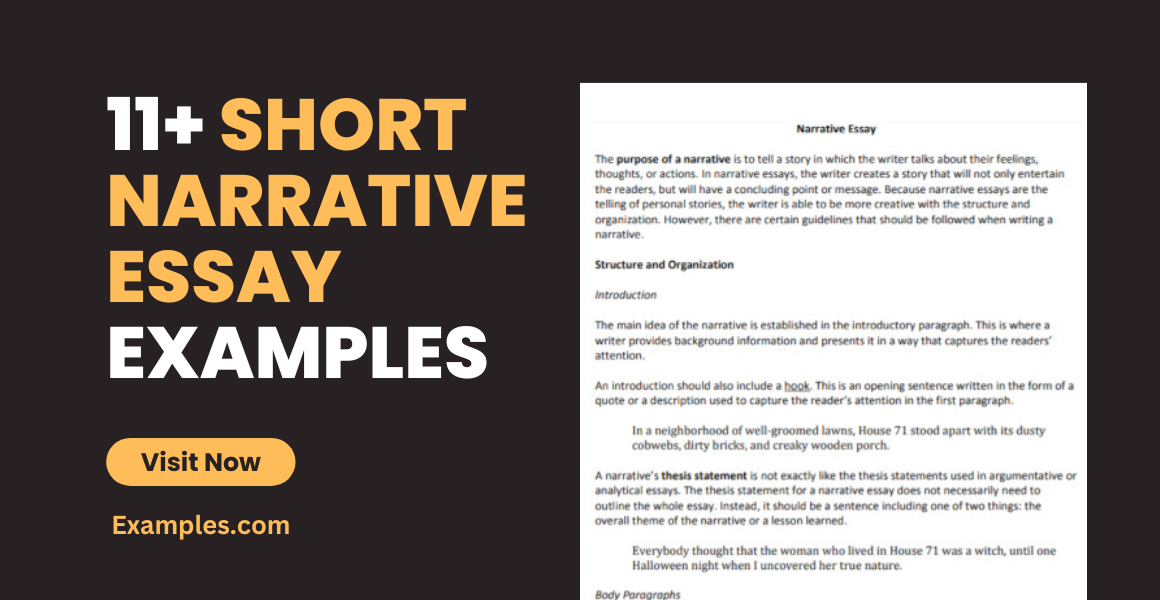
Everyone finds it interesting to tell stories about their lives or about someone else’s. Through those stories, we can get lessons which we can apply in our daily lives. This is what a narrative essay is all about. Let’s go back to your experiences when you were still in grade school. Your teacher would often ask you to write about your favorite experiences especially during Christmas season and summer vacation.
Some people would mistakenly identify a narrative essay as equally the same as a descriptive essay . They are totally different from each other, yet both of them are forms of academic writing . Look into this article to learn more about narrative essays.
What is Short Narrative Essay?
A short narrative essay is a brief piece of writing that tells a story, usually focusing on a particular experience, event, or moment. It follows a narrative structure, involving characters, a setting, a plot, and a conclusion, aiming to engage the reader through vivid descriptions and storytelling techniques within a concise format.
Best Short Narrative Essay Examples?
Title: The Summer Adventure
The scorching sun bore down on the dusty road as we embarked on our summer adventure. Packed into the old, battered car, my family and I set off for the great outdoors. The air hummed with anticipation, echoing our excitement for the unknown.
As we traversed winding roads, the landscape unfolded like a painting. Rolling hills adorned with emerald-green trees greeted us, promising the allure of exploration. The scent of pine wafted through the open windows, mingling with laughter and the crackling excitement of adventure.
Our destination? A secluded lakeside campsite embraced by nature’s serenity. The promise of tranquil waters and starlit nights ignited our spirits. Upon arrival, we pitched our weathered tent, a ritual signaling the beginning of our escape from routine.
Days melted into each other, filled with hikes through dense forests, dips in cool, crystal-clear waters, and evenings spent around crackling campfires. We discovered hidden trails, stumbled upon secret meadows, and marveled at nature’s splendid orchestra of sounds and colors.
But amidst the beauty lay unexpected challenges. Unforgiving storms threatened our haven, testing our resilience. Yet, huddled together, we found solace in each other’s company, discovering strength in unity.
As the final sun dipped behind the horizon, casting its golden glow upon the rippling waters, a bittersweet sensation enveloped us. The adventure had drawn to a close, leaving behind cherished memories etched in our hearts.
Reluctantly, we packed our belongings, bidding farewell to the tranquil haven that had nurtured us. With weary but contented hearts, we embarked on the journey back, carrying not just souvenirs but a treasure trove of shared experiences and the promise of future escapades.
The car rolled away from the lakeside, but the echoes of laughter, the scent of pine, and the warmth of togetherness lingered, reminding us of the magical summer adventure that had woven us closer together.
11+ Short Narrative Essay Examples
1. short narrative essay examples.
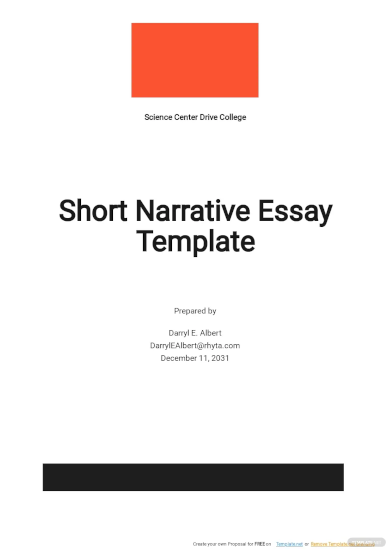
- Google Docs
Size: 27 KB
2. Narrative Essay Examples
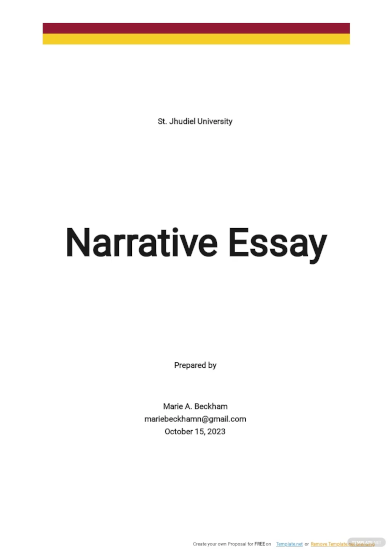
Size: 23.8 KB
3. Short Narrative Essay Template
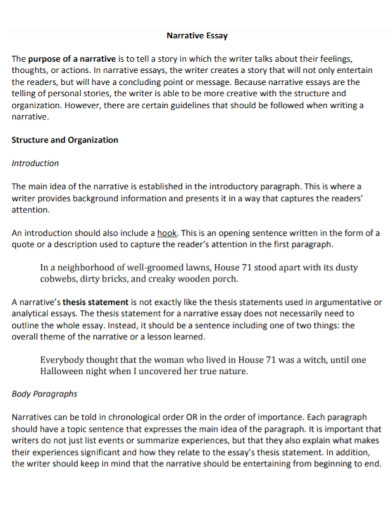
Size: 465 KB
4. Short Narrative Essay
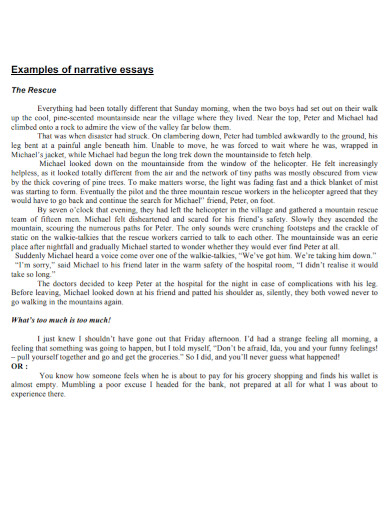
Size: 117 KB
5. Short Narrative Essay Format
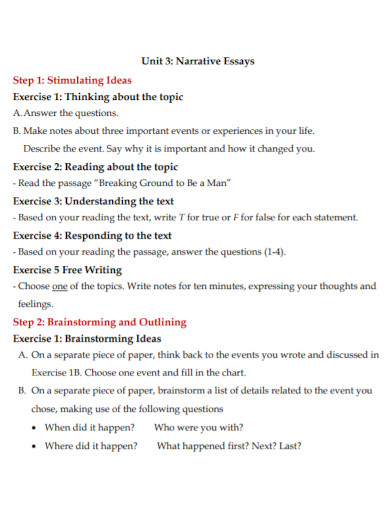
Size: 107 KB
6. The Storm Short Narrative Essay
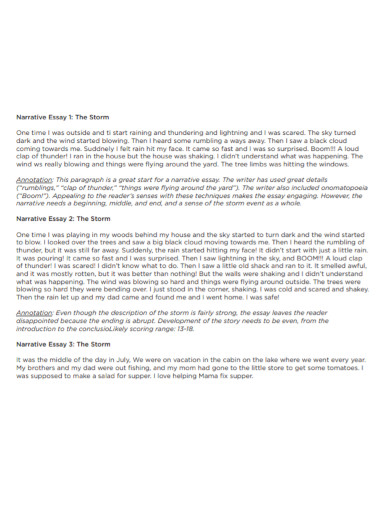
Size: 48 KB
7. Five-Paragraph Short Narrative Essay
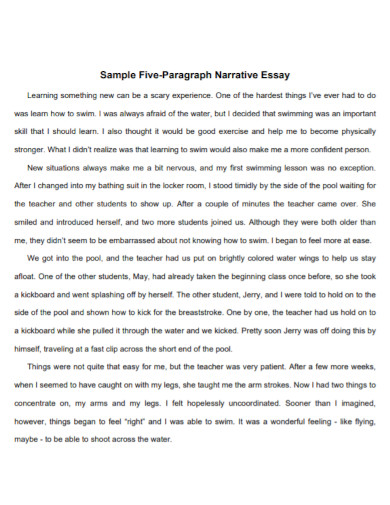
Size: 29 KB
8. Short Narrative Writing Essay
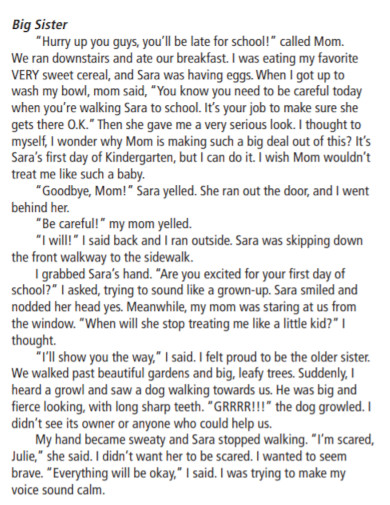
Size: 177 KB
9. College Short Narrative Essay
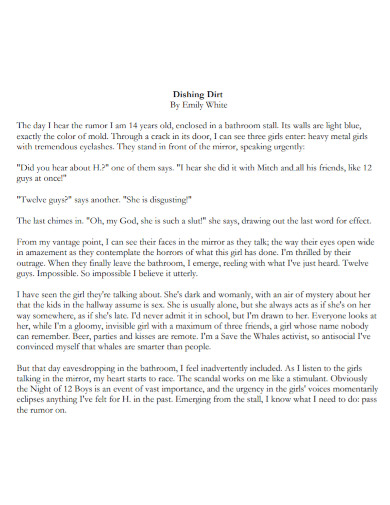
Size: 589 KB
10. High School Short Narrative Essay Examples
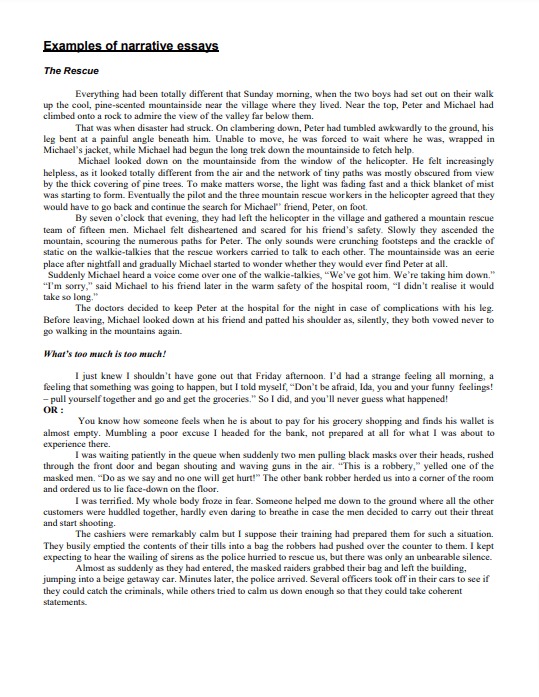
Size: 114 KB
11. College Short Narrative Essay Examples
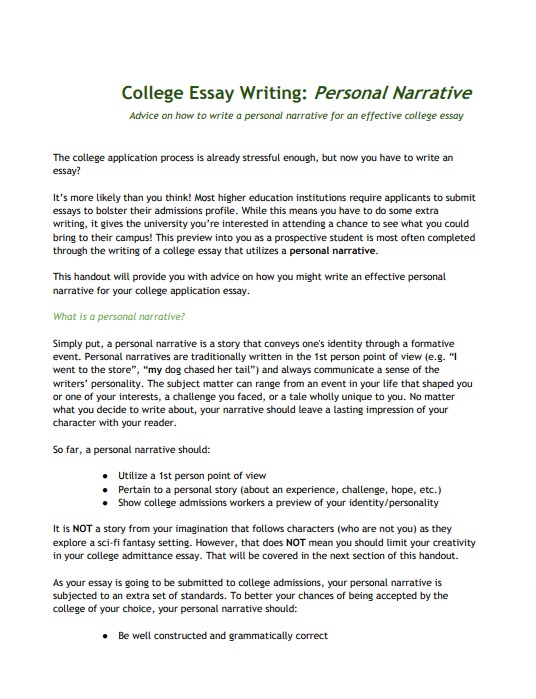
Size: 130 KB
12. Personal Short Narrative Essay Examples
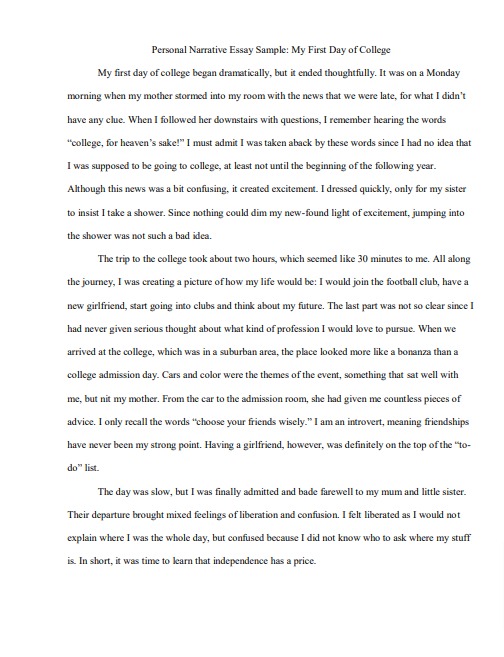
Size: 105 KB
What is a Narrative Essay?
A narrative essay is a type of academic writing that allows you to narrate about your experiences. This follows a certain outline just like what we have observed in argumentative essays , informative essays and more. The outline consists of the introduction, body paragraph and conclusion.
This is a type of essay that tells a story either from the point of view of the author or from the personal experience of the author. It should also be able to incorporate characteristics such as the ability to make and support a claim, develop specific viewpoint, put conflicts and dialogue in the story, and to use correct information. You may also see personal narrative essay examples & samples
The purpose of a narrative essay is to be able to tell stories may it be real or fictional. To enable us to write a perfect narrative essay, the author should include the necessary components used for telling good stories, a good climax, setting, plot and ending.
How To Write a Narrative Essay?
Compared to all types of academic essay , the narrative essay is the simplest one. It is simply written like the author is just writing a very simple short story. A typical essay has only a minimum of four to five paragraphs contain in the three basic parts: introduction, body paragraph and conclusion. A narrative essay has five elements namely the characters, plot, conflict, setting and theme.
Plot – this tells what happened in the story or simply the sequence of events. There are five types of plot: exposition, rising action, climax, falling action and resolution. The exposition is the an information that tells about background of the story. It can be about the character, the setting, events, etc. Rising action is where the suspense of a story begins. It helps build toward the climax of a story. Climax is the most intense part of the story. Falling action happens after the climax when it is already almost the end of the story. Resolution is the part where the problem has already been resolved.
Characters – it is the person or other being that is a part of the narrative performs an action or speak a dialogue .
Conflict – this is the struggle or the problem that is faced by the characters of the story. This can be an external conflict and an internal conflict. An external conflict is a type of problem that is experienced in the external world. An internal conflict is the type of conflict that refers to the characters’ emotions and argument within itself.
Setting – this is knowing where and when the story takes place. This can be a powerful element because it makes the readers feel like they are the characters in the story.
Theme – this is what the author is trying to convey. Examples of a theme are romance, death, revenge, friendship, etc. It is the universal concept that allows you to understand the whole idea of the story.
How to write a short narrative essay?
- Select a Theme or Experience: Choose a specific event, moment, or experience that you want to narrate.
- Outline the Story: Plan the narrative by outlining the key elements – characters, setting, plot, and a clear beginning, middle, and end.
- Engaging Introduction: Start with a hook to captivate readers’ attention, introducing the setting or characters involved.
- Develop the Plot: Write body paragraphs that progress the story logically, describing events, actions, and emotions, using vivid details and sensory language to immerse readers.
- Character Development: Focus on character traits, emotions, and reactions to make the story relatable and engaging.
- Climax and Resolution: Build tension towards a climax, followed by a resolution or lesson learned from the experience.
- Concise Conclusion: Conclude the essay by summarizing the experience or reflecting on its significance, leaving a lasting impression on the reader.
- Revise and Edit: Review the essay for coherence, clarity, grammar, and punctuation, ensuring it flows smoothly.
What are the 3 parts of a narrative essay?
- Introduction: Sets the stage by introducing the story’s characters, setting, and providing a glimpse of the main event or experience. It often includes a hook to capture the reader’s attention.
- Body: Unfolds the narrative, presenting the sequence of events, actions, emotions, and details that drive the story forward. It develops the plot, characters, and setting.
- Conclusion: Summarizes the narrative, reflecting on the significance of the experience or event, and often delivers a lesson learned or leaves a lasting impression on the reader.
How do you start a narrative essay with examples?
- ” ‘Are we there yet?’ echoed in my ears as our family car trudged along the endless highway, marking the beginning of our unforgettable summer road trip.”
- “The sun dipped low on the horizon, casting a warm, golden hue over the serene lake. It was there, amidst the tranquil waters, that my adventure began.”
- “The deafening roar of applause faded as I stepped onto the stage, my heart racing with anticipation. Little did I know, that moment would change everything.”
- “Looking back, it all started with a single decision. That decision, made in a moment of uncertainty, led to a series of events that transformed my life.”
- “The scent of freshly baked cookies wafted through the air, mingling with the joyous laughter of children. It was a typical afternoon, until an unexpected visitor knocked on our door.”
How do you start a narrative introduction?
You may start by making the characters have their conversation or by describing the setting of the story. You may also give background information to the readers if you want.
What makes a good narrative?
A good narrative makes the readers entertained and engage in a way that they will feel like they are becoming a part of the narrative itself. They should also be organized and should possess a good sequence of events.
How many paragraphs are there in personal narratives?
Usually, there are about five paragraphs.
How many paragraphs are in a short narrative essay?
A short narrative essay typically comprises an introductory paragraph introducing the story, three to four body paragraphs unfolding the narrative, and a concluding paragraph summarizing the experience.
How long is a short narrative essay?
A short narrative essay typically ranges from 500 to 1500 words, aiming to convey a concise and focused story or experience within a limited word count.
Narrative essays are designed to express and tell experiences making it an interesting story to share. It has the three basic parts and contains at least five elements. If you plan to create a good narrative essay, be sure to follow and assess if your narrative has all the characteristics needed to make it sound nice and pleasing.
Text prompt
- Instructive
- Professional
Write a Short Narrative Essay on a memorable moment with your family.
Create a Short Narrative Essay about a lesson learned from a mistake.
Clash of Titans: the Epic Saga of Rome and Carthage
This essay about the Punic Wars offers a vivid portrayal of the epic struggle between Rome and Carthage, spanning centuries and reshaping the Mediterranean world. It highlights the three distinct phases of conflict, from the initial clash over Sicily to the legendary campaigns of Hannibal Barca and the eventual downfall of Carthage. Through a narrative rich in ambition, betrayal, and valor, the essay explores how these wars defined the trajectory of ancient empires, leaving an indelible mark on history and raising enduring questions about power, identity, and the human condition.
How it works
In the annals of history, few conflicts rival the epic saga of the Punic Wars, where the titans of Rome and Carthage clashed in a struggle for supremacy that reverberated across the ancient world. This tale of ambition, betrayal, and valor spans centuries, leaving an indelible mark on the Mediterranean landscape and shaping the destiny of empires. Let us embark on a journey through the sands of time, unraveling the intricate tapestry of these momentous events.
The seeds of conflict were sown in the fertile soil of rivalry and ambition, as Rome and Carthage vied for dominance in the Mediterranean basin.
At the heart of their contention lay the strategic island of Sicily, a coveted prize that would ignite the flames of war. The First Punic War, erupting in 264 BCE, saw the clash of two formidable powers, each boasting formidable armies and naval fleets. Rome, known for its military prowess on land, ventured into uncharted waters, challenging Carthage’s maritime supremacy. The ensuing struggle for control of Sicily would become a test of wills, endurance, and innovation, as both sides marshaled their resources in a bid for victory.
As the dust settled on the battlefield, Rome emerged triumphant, securing its grip on Sicily and expanding its sphere of influence across the western Mediterranean. Yet, the peace that followed was but a brief respite from the storm, as tensions simmered beneath the surface, ready to erupt once more. It was not long before the specter of war loomed once again, casting its long shadow over the ancient world.
The Second Punic War, spanning from 218 to 201 BCE, unfolded as a tale of courage and audacity, epitomized by the legendary Carthaginian general, Hannibal Barca. With a daring march across the Alps, Hannibal unleashed a campaign of unparalleled ferocity, striking deep into the heart of Roman territory. His victories at Cannae and Trebia sent shockwaves through the Roman Republic, as legions fell before the might of his Carthaginian army. Yet, for all his brilliance on the battlefield, Hannibal ultimately found himself outmaneuvered by the strategic genius of Rome’s own Scipio Africanus. In the sands of Zama, the fate of empires hung in the balance, as Roman discipline clashed with Carthaginian resolve. In the end, it was Rome who emerged victorious, dealing a decisive blow to Carthage’s aspirations of supremacy.
But the story does not end there, for the specter of Carthage would haunt the corridors of power in Rome for years to come. The Third Punic War, fought from 149 to 146 BCE, would mark the final chapter in Carthage’s storied history. Fueled by fears of Carthaginian resurgence, Rome laid siege to the city with relentless determination. The fall of Carthage was a tragedy of epic proportions, as flames consumed its once-great citadels, and its people were scattered to the winds. With the destruction of Carthage, Rome stood unchallenged as the undisputed master of the Mediterranean, its empire stretching from the shores of Spain to the sands of Syria.
Yet, the legacy of the Punic Wars extends far beyond the battlefield, shaping the course of history in ways both profound and enduring. Rome’s triumph marked the dawn of a new era, as its empire expanded to encompass vast territories and diverse cultures. The spoils of war brought wealth and prosperity to the Republic, fueling its ambitions and entrenching its dominance over the known world. But the cost of victory was steep, as the scars of war left their mark on the fabric of Roman society, raising questions of identity, citizenship, and the nature of power.
In conclusion, the Punic Wars stand as a testament to the resilience of the human spirit and the inexorable march of history. In the clash of titans that defined this epic saga, we find echoes of our own struggles and aspirations, reminding us of the enduring legacy of those who came before. As we look back on these ancient conflicts, let us not forget the lessons they impart, for in their shadows lie the keys to unlocking the mysteries of our shared past.
Cite this page
Clash of Titans: The Epic Saga of Rome and Carthage. (2024, May 21). Retrieved from https://papersowl.com/examples/clash-of-titans-the-epic-saga-of-rome-and-carthage/
"Clash of Titans: The Epic Saga of Rome and Carthage." PapersOwl.com , 21 May 2024, https://papersowl.com/examples/clash-of-titans-the-epic-saga-of-rome-and-carthage/
PapersOwl.com. (2024). Clash of Titans: The Epic Saga of Rome and Carthage . [Online]. Available at: https://papersowl.com/examples/clash-of-titans-the-epic-saga-of-rome-and-carthage/ [Accessed: 27 May. 2024]
"Clash of Titans: The Epic Saga of Rome and Carthage." PapersOwl.com, May 21, 2024. Accessed May 27, 2024. https://papersowl.com/examples/clash-of-titans-the-epic-saga-of-rome-and-carthage/
"Clash of Titans: The Epic Saga of Rome and Carthage," PapersOwl.com , 21-May-2024. [Online]. Available: https://papersowl.com/examples/clash-of-titans-the-epic-saga-of-rome-and-carthage/. [Accessed: 27-May-2024]
PapersOwl.com. (2024). Clash of Titans: The Epic Saga of Rome and Carthage . [Online]. Available at: https://papersowl.com/examples/clash-of-titans-the-epic-saga-of-rome-and-carthage/ [Accessed: 27-May-2024]
Don't let plagiarism ruin your grade
Hire a writer to get a unique paper crafted to your needs.

Our writers will help you fix any mistakes and get an A+!
Please check your inbox.
You can order an original essay written according to your instructions.
Trusted by over 1 million students worldwide
1. Tell Us Your Requirements
2. Pick your perfect writer
3. Get Your Paper and Pay
Hi! I'm Amy, your personal assistant!
Don't know where to start? Give me your paper requirements and I connect you to an academic expert.
short deadlines
100% Plagiarism-Free
Certified writers
6 Ways Schools Are Managing Students’ Cellphone Use

- Share article
A flurry of school districts across the country are tightening cellphone restrictions, because they believe students’ misuse of the devices has negatively affected their behavior and ability to learn.
In 2015, 66 percent of schools in the United States prohibited non-academic use of cellphones during school hours, according to the National Center for Education Statistics . By 2020, that percentage had jumped to 77 percent.
Many educators blame students’ cellphone use for being the top distraction in schools and classrooms . The constant use of the devices has also been linked to students’ worsening mental health .
The issue has caught the attention of federal and state policymakers, too. Some states—such as California, Florida, Indiana, and Tennessee—have passed laws allowing schools to restrict cellphone use. A handful of other states are considering passing similar laws. Congressional lawmakers have also introduced legislation that would require a federal study on the effects of cellphone use on students’ mental health and academic performance.
Liz Kolb, a clinical professor of education technologies and teacher education at the University of Michigan, said it’s unlikely that all 50 states will pass laws restricting students’ cellphone use, “but we’re seeing a lot more [movement] at the individual school level, where they’re trying to figure out policies that make sense [for their communities].”
At the district level, these restrictions vary widely. Some districts restrict student cellphone use anywhere and any time during the school day. Some allow use of the devices during lunch and in the hallways. And others haven’t placed any restrictions at all, often because of parent and student pushback.
Even in districts where there’s a ban, “there’s a lot of nuance” in how schools are addressing it, Kolb said. “In order for a full school ban to be effective, you really have to have strong leadership supporting the staff in enforcing it.”
Some of those nuances include exceptions for students who have a documented need to have their digital devices for health reasons, such as checking blood glucose levels if a student has diabetes. Teachers also have the flexibility to allow students to use their cellphones in class if they are needed for instructional purposes.
Here are six different policy approaches districts are putting in place to address concerns about student cellphone use:
1. Cellphones are restricted for all students, regardless of grade level
In Florida’s Orange County district , all students are prohibited from using their cellphones and other wireless communication devices, such as smartwatches, during school hours—meaning from the first bell to the dismissal bell, these devices must be silenced and put away in their bags. If a student is caught using a phone during the school day, the device will be confiscated and returned to the student at the end of the day. Depending on the circumstances of the violation, a student could also get detention or be suspended.
Flint schools in Michigan also prohibit all students, regardless of grade level, from using cellphones or other personal electronic devices. If a student is caught using a phone, it will be confiscated and returned to the student’s parent or caretaker.
Some districts provide technological solutions, such as pouches, to lock and store students’ phones during the school day. In other districts, educators have found creative ways to separate students from their phones, such as using over-the-door shoe holders where students place their phones during class.
2. Cellphones restricted only for elementary students, more flexible for middle and high school students
While restrictions on the use of cellphones and other two-way communication devices exist for all students in the Wauwatosa district in Wisconsin , there are more flexible rules for middle and high school students. Cellphones are prohibited all day for elementary students, but middle and high school students can use their phones before and after school, between class periods, during lunch, and in free periods. Teachers and principals have discretion for imposing consequences for misuse.

3. Cellphones are prohibited for elementary and middle school students, but more flexible for high school students
Elementary and middle school students in Virginia’s Rockingham district are prohibited from using personal electronic devices during the school day, while high school students may use their devices during lunch, study hall, advisory periods if permitted by a teacher and principal, and in between classes.
4. Cellphones are restricted only in classrooms, locker rooms, and bathrooms
Other districts, such as Richmond schools in Wisconsin, have restrictions on cellphone use only in certain areas of schools, such as classrooms, locker rooms, and bathrooms—to prevent bullying or sharing of inappropriate images, according to some district policies.
5. Cellphones restricted only in classrooms
Some restrictions are centered around classroom time only and allow students to use their phones outside of the classroom. In the Brush school district in Colorado , for instance, students aren’t allowed to have their phones out during instructional hours but can use them any other time. If a student is caught with a phone when they’re not allowed to have it, parents can either come to school to collect the phone or they can let the school keep the phone until the end of the day.
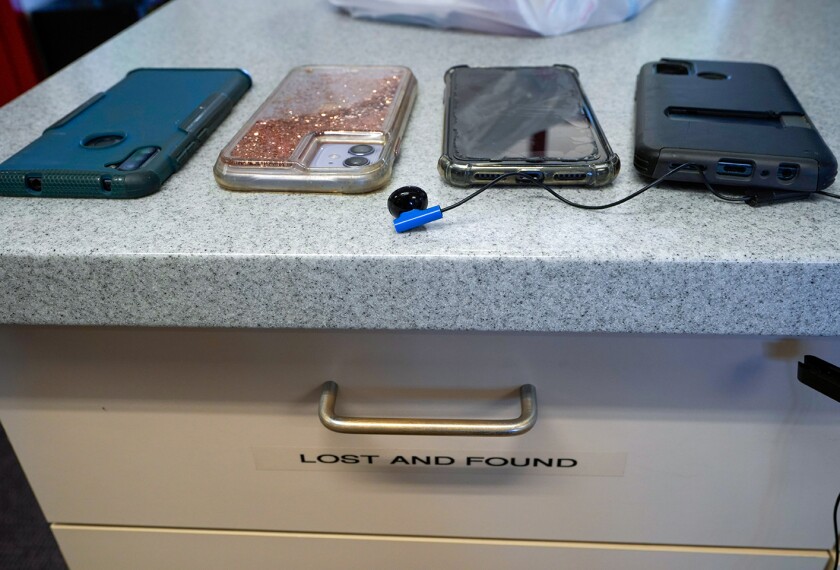
6. Cellphone restrictions are left up to each school
There are also districts, such as Meriden in Connecticut and Minnetonka in Minnesota, that don’t have districtwide restrictions, but instead have guidelines that schools can choose to follow.
For instance, in Meriden, the guidelines recommend elementary students keep their phones in their bags the whole school day; middle school students keep their phones in their lockers but can use them during lunch; and to let high school students have access to their phones all day but they must be turned off and out of sight during class time.
Other districts, such as Pawtucket in Rhode Island , allow principals or teachers to implement their own school or classroom rules around cellphones, as long as there’s a clear plan for allowing students to use them in case of emergencies.
Sign Up for EdWeek Tech Leader
Edweek top school jobs.

Sign Up & Sign In


COMMENTS
They really need a structure for this. So, the typical essay, before they get to me, goes like this, and it is a good precursor: Introduction that states your thesis and 3 major reasons to support your claim. Reason 1. Reason 2. Reason 3. Conclusion that looks a whole lot like the introduction.
Sixth Grade Informative Essay Sample 4. Sixth Grade Narrative Sample 1. Sixth Grade Narrative Sample 2. Sixth Grade Narrative Sample 3. Sixth Grade Narrative Sample 4. Logo Image. Logo Title. Oakdale Joint Unified School District. 168 South 3rd Avenue. Oakdale. CA. 95361. USA. 209-848-4884. 209-847-0155.
These paragraphs should also be three to five sentences each. Finish your sixth-grade essay by writing the final paragraph, which is its conclusion. Summarize the statements made in the body paragraphs to reiterate the thesis statement made in the first one. Persuade the reader to see your view on the topic, based on the points made throughout ...
Narrative Essay Topic Ideas for Students. Argumentative Essay Topics for Middle School. Expository Essay Topic Ideas. Story Writing Topics for Grades 5 - 9. Essay writing curriculum 6th grade. These 37 essay topics for 6th graders will help your kids form opinions, explore their ideas on paper, and express their thoughts confidently.
Grade 6 Level 5 Writing Sample. Compare your home, village or city to the place you live now. Describe things that are the same and different. View full size. Student writing sample: My old city and my new country are worlds apart. There are things that are the same and some other things that are really different.
In the first year of middle school, kids are expected to write essays and stories, share their writing, and compare literary texts. This year, your sixth grader should learn to use precise language, the right pronouns, and high-quality sources for research. Public presentations are also a nerve-wracking but important skill highlighted this year.
6th grade students will be asked to argue for or against the ban of junk food in vending machines. Vending machines are often used by people who are hungry and in a hurry. The vending options are usually less than healthy. ... These essay topics will go along with any persuasive writing unit in your writing curriculum! Let your student go ...
Narrative Writing. Grade 6 Sample. Splash! Feedback for Improvement. What worked: There is a sense of story with a beginning, middle and end. The word choice is often high level - slammed, sprinted, flopped, tranquil, glistened. Entertaining Beginning: There was a mix of sound, action and thought - the author established the setting - the pond ...
They can include a story in their response, like talking about the chores they have at home, but it shouldn't be the focus. Write a short story about your favorite fictional character. This prompt can have a narrative or creative response, or both at the same time. The response should make sense for that character, for example, if they are ...
Writing a literary essay in the sixth grade is a fairly straightforward process that should take only a few hours to complete. In middle school, students traditionally use the five-paragraph essay format, which is organized as follows: an introduction paragraph, three body paragraphs and a conclusion. The essay should normally be between one ...
These prompts will help your sixth graders learn the essentials of procedural writing. 26. Make a user guide for anything you use frequently (e.g., your computer, smartphone, video game console). 27. Write a set of instructions for cleaning your room. 28.
These powerful 6 th grade writing prompts are designed to help students think critically about some of the most important issues they face in today's world. With questions on topics like bullying and Internet usage, your students will have the chance to reflect on what it means to be a teenager today and how popular culture influences their ...
Released Writing Prompt, Sample Student Essays, and Scoring Notes . This document contains the following information: 1) A released ISASP Writing prompt that was previously administered to students in the relevant grade as part of the ISASP Language/Writing test. 2) A copy of the scoring rubric that was used to guide scoring.
Persuasive Essay Typing Examples The American Crises via swanngalleries.com. From the earliest date of print, authors have used persuasive articles to try until sway others to their own point of view. ... There is but little virtue in the action of masses of men." 6th Grade Print Samples - Oakdale Jointed Unified School District. Go Gentle ...
Hopefully, this article is useful for you to write the 6th-grade essay - all the essay peculiarities are described and applied. Have a look at it again or consider the following list of 5 extra resources to write a good essay at the 6th grade. 5 Extra References to Write a Good 6th-Grade Essay. Aczel, R. (1998). How to write an essay ...
This sampler can be used as a resource for Florida educators, schools, and districts regarding the scoring of student responses on the B.E.S.T. Writing assessments. Each spring, students in grades 4-10 are administered a set of source texts and a writing prompt based on those sources.
The AASA ELA test will have a Writing unit and a Reading Unit 1 and Unit 2 for all grade levels. The structure of the sample Writing test is similar to the actual AASA Writing test. Each Writing test will have one or more passages that relate to a prompt. Students will create a written response to the prompt.
Student Sample: Grade 6, Argument (Opinion) - Page 36 "Dear Mr. Sandler" For writing sample please refer to page 36 of Appendix C: Samples of Student Writing TRAIT SCORES TRAIT ANNOTATIONS CCSS ANNOTATIONS
Worksheet. 1. Comprehensive K-12 personalized learning. Immersive learning for 25 languages. Trusted tutors for 300 subjects. Adaptive learning for English vocabulary. Fun educational games for kids. Spanish-English dictionary, translator, and learning. Fast and accurate language certification.
Student Models. When you need an example written by a student, check out our vast collection of free student models. Scroll through the list, or search for a mode of writing such as "explanatory" or "persuasive.".
Here are some fun and inspiring essay topic for 6th graders: Describe your favourite place. Describe your ideal bedroom. Describe the house in which you grew up. Describe what the first house on the moon would look like. Describe some of your favourite places in your hometown.
B.E.S.T. Writing Sample Items Writing Prompt Write an expository essay about the ways gold has been used throughout history. Your expository essay must be based on this prompt and topic, and it must incorporate ideas and information found in the sources provided. Use your best writing to complete an essay that • is focused on your central idea;
Sample items can inform discussions about state and local standards, curriculum, instruction, and assessment. Improving Instruction . Teachers may use the TDA sample questions in classroom activities in order to help students understand how to: • respond to TDA questions in essay form using with complete, thought-out answers; and
A short narrative essay typically ranges from 500 to 1500 words, aiming to convey a concise and focused story or experience within a limited word count. Narrative essays are designed to express and tell experiences making it an interesting story to share. It has the three basic parts and contains at least five elements.
The First Punic War, erupting in 264 BCE, saw the clash of two formidable powers, each boasting formidable armies and naval fleets. Rome, known for its military prowess on land, ventured into uncharted waters, challenging Carthage's maritime supremacy. The ensuing struggle for control of Sicily would become a test of wills, endurance, and ...
A cellphone sits on a student's desk during a 9th grade honors English class at Bel Air High School in Bel Air, Md., on Jan. 25, 2024. The policies that districts and schools use to manage the use ...